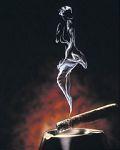| Chinese Idioms | |
|---|---|
| Nov 22, 2007 03:15 | |
 | Every language has its idiomatic expressions. Chinese abounds with idioms. Do you know these idioms and how to translate them into English? For example: 老王卖瓜, 自卖自夸 Lao(3) Wang(3) Mai(4) Gua(1), Zi (4) Mai (4) Zi (4)Kua(1) Lao Wang selling melons praises his own goods--to praise one's own works or wares.) 红颜祸水 Hong(3) Yan(2) Huo(4) Shui(3) Women are the root of trouble. /No war without a woman./ Women are the snares of Satan./Women are the devil's nets. Do you have some more? Can we share? Or do you have some Enlish idioms? We will try to find out if there are some Chinese equivalents? |
| Nov 22, 2007 14:13 | |
 | just a quick correction, lao(3) wang(2) |
| Nov 22, 2007 15:34 | |
 | 老王卖瓜, 自卖自夸 In American English we would call that: "blowing your own horn" The funny thing about that is that we are taught that it is bad to blow your own horn...but on the other hand - marketeers make millions by blowing their own horns ??? As for your idiom about women being the root of all evil.... You could consider the biblical Eve... Or as I heard on the radio the other day, "Giving women power is like giving monkeys machineguns!" No offense intended ladies... |
| Nov 23, 2007 02:45 | |
 | Quote: "The funny thing about that is that we are taught that it is bad to blow your own horn." In China, "老王卖瓜, 自卖自夸" also carries negative sense. "Giving women power is like giving monkeys machineguns!" But this one sounds a little awkward. Does it mean that once monkeys got a machinegun, it must use the gun to kill somebody? |
| Nov 23, 2007 07:46 | |
 | Yvonne, what it means is they will become dangerous, like I say about myself " if I had a brain I would be dangerous," he he |
Post a Reply to: Chinese Idioms









 Copyright © 1998-2026 All rights reserved.
Copyright © 1998-2026 All rights reserved.